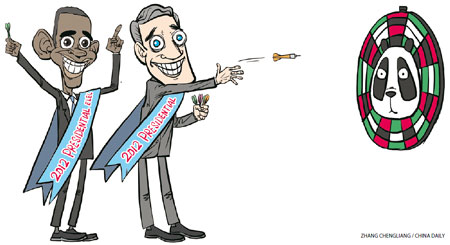For US election candidates, China is an easy target


There has been a noticeable escalation in US confrontational rhetoric and actions in recent weeks regarding China. Legislation continues to percolate in Congress that would impose tariffs and other sanctions on Chinese imports unless Beijing significantly revalues its currency.
Mitt Romney, one of the leading candidates for the Republican Party's presidential nomination, has been especially hard-hitting. Pledging to "clamp down" on trade "cheaters," he added (to strong applause during a debate) that "China is the worst example of that. They have manipulated their currency to make their products artificially inexpensive". He also pledged to "go after them for stealing our intellectual property".
Such harsh rhetoric is not confined to trade and currency issues. Criticisms of China's human rights record and allegations that Beijing may pose a security threat to the US are also on the rise.
It is not a coincidence that such angry sentiments are becoming more prominent now. China bashing appears to spike during every presidential election cycle. The good news is that the confrontational rhetoric and policy proposals have always receded once the election is over, and they have never done lasting damage to bilateral relations. The bad news is that this time there appears to be some additional factors that could prolong the confrontational approach and cause lasting tensions in the relationship.
As far back as 1980 candidates sought to score political points by taking a hard line toward China. Ronald Reagan repeatedly criticized president Jimmy Carter for establishing diplomatic relations with Beijing, and on at least one occasion he implied that, if elected president, he would consider rescinding that decision. Yet, once in the White House, Reagan adopted generally prudent and constructive policies toward China. He even signed the communique in 1982 that pledged to gradually end US arms sales to Taiwan.
A similar pattern occurred following the 1992 election. The Democratic Party nominee, Bill Clinton, and the independent candidate Ross Perot vied with each other to adopt harsh language regarding China and to criticize the administration of George H. W. Bush for being too "soft" toward Beijing. In a speech to the Los Angeles World Affairs Council in August 1992 Clinton excoriated Bush and leveled numerous accusations at China. He promised to adopt a much harder line than Bush had on both trade and security issues. Yet within a year of taking office, such ugly comments disappeared and US-China relations in both areas were not significantly different than they had been under previous administrations.
In the 2000 election campaign Clinton, the China-basher of 1992, came under fire from the Republican presidential candidate George W. Bush for being too soft on China. Noting that Clinton had described China and the US as strategic partners, Bush said the relationship should be redefined as one of strategic competitors.
US-China relations did get off to a rocky start during the Bush administration. As the Bush presidency continued, relations between Washington and Beijing resumed their cordial, constructive course.
Is the same pattern we have seen so often before likely to occur again once this year's US presidential election is over? Perhaps. But there are troubling signs that the discontent with China is deeper and more substantive this time.
And that discontent is not reflected just in confrontational rhetoric. The Obama administration took several actions in autumn that seemed intended to counter China's rise. An early signal was Secretary of State Hillary Clinton's prominent article in Foreign Affairs, America's leading foreign policy journal, indicating that US policy was "pivoting" toward Asia, especially East Asia. That move was widely interpreted as directed against China.
Speeches by both Hillary Clinton and Barack Obama in East Asia in mid-November strengthened that impression. The first volley came from Clinton during a visit to the Philippines on Nov 16. She made especially combative remarks regarding the dispute between China and several of its neighbors, including the Philippines, over competing territorial claims in the South China Sea. "Any nation with a claim has a right to exert it," Clinton said, "but they do not have a right to pursue it through intimidation or coercion." She added that "the United States will always be in the corner of the Philippines and we will stand and fight with you".
Chinese officials may have had even more reason to be troubled by Obama's comments. In an address to the Australian parliament on Nov 17 Obama bluntly asserted that "the United States is a Pacific power, and we are here to stay". He added that Washington had made a "strategic decision" that "the United States will play a larger and long-term role in shaping this region and its future". During his visit, Obama also announced that the US would send military aircraft and as many as 2,500 marines to northern Australia over the next few years.
Security experts were at a loss to explain any motive for such a symbolic deployment other than to provide a veiled warning to China not to engage in any threatening behavior toward US allies in East Asia.
A key difference in the pattern during this presidential election campaign and previous ones is that the US is more insecure, especially about the persistent economic recession and Washington's continuing, massive federal budget deficits. At the same time, Americans across the political spectrum sense, correctly, that China's economic influence and military strength are both increasing. That adds to the uneasiness of US political leaders and the US people about the bilateral relationship.
The need to rely on continued Chinese funding of Washington's treasury debt fosters resentment rather than gratitude. Although most US people believe that their country is still the world's leading power, certainly in military terms and even in economic terms, there is a growing worry that China is gaining rapidly in both arenas. It is becoming all too easy to see Beijing as a potential adversary and to blame China for US fiscal and economic woes.
That temptation to use China as a scapegoat is not likely to disappear after the election. Indeed, it probably will not abate until the US regains its economic and financial health.
The author is a senior fellow at the Cato Institute. The views expressed in the article do not necessarily reflect those of China Daily.
(China Daily 01/13/2012 page9)
Today's Top News
- Envoy: Japan not qualified to bid for UN seat
- Deforestation is climate action's blind spot
- Japan unqualified for UN Security Council: Chinese envoy
- China, Germany reach outcomes after discussions
- Chinese cities dominate global science hub rankings
- Japan's tourism battered as Chinese travelers cancel trips






























